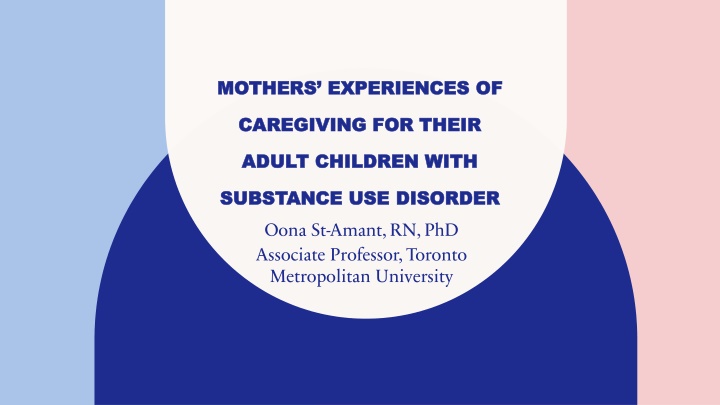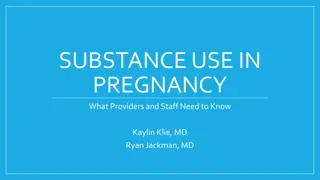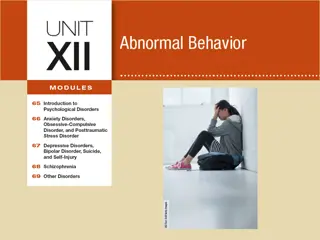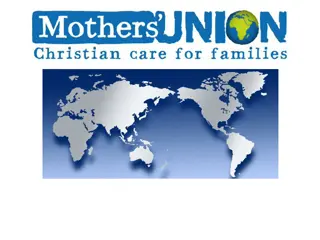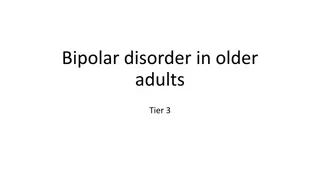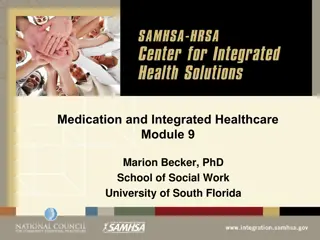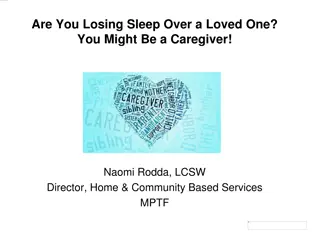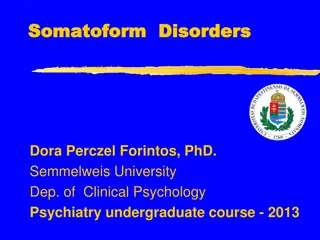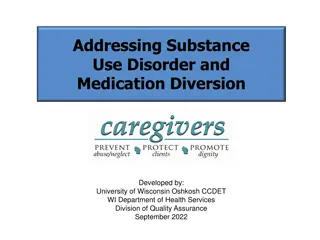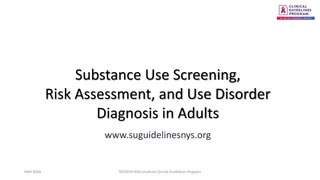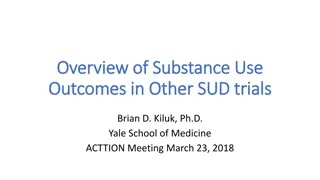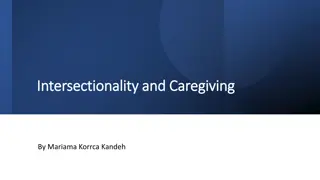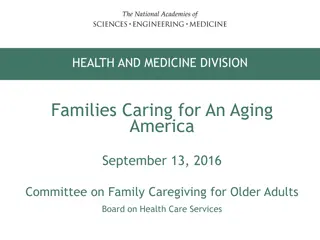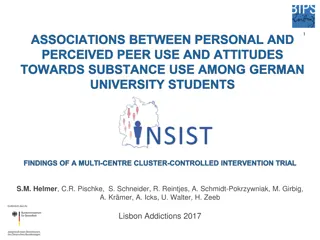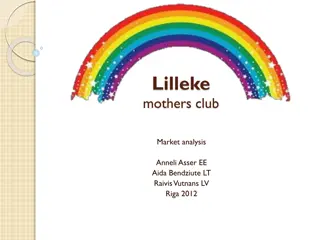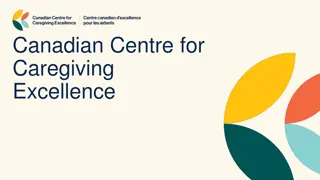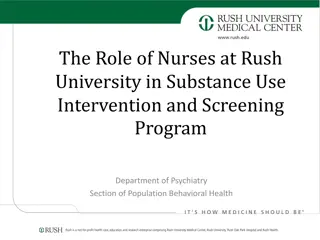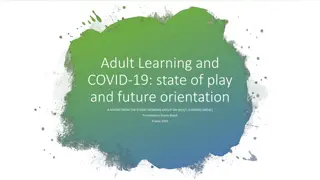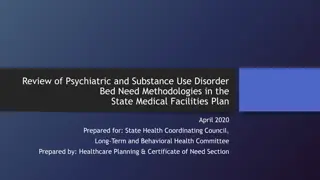Mothers' Experiences of Caregiving for Adult Children with Substance Use Disorder
Examining the historical perspectives influencing family roles in addiction, this study delves into the challenges faced by mothers caring for adult children with substance use disorder (SUD). It highlights the impact on families, the prevalence of addiction in Canada, and the imperative role of family involvement in treatment and recovery.
Download Presentation

Please find below an Image/Link to download the presentation.
The content on the website is provided AS IS for your information and personal use only. It may not be sold, licensed, or shared on other websites without obtaining consent from the author.If you encounter any issues during the download, it is possible that the publisher has removed the file from their server.
You are allowed to download the files provided on this website for personal or commercial use, subject to the condition that they are used lawfully. All files are the property of their respective owners.
The content on the website is provided AS IS for your information and personal use only. It may not be sold, licensed, or shared on other websites without obtaining consent from the author.
E N D
Presentation Transcript
MOTHERS EXPERIENCES OF MOTHERS EXPERIENCES OF CAREGIVING FOR THEIR CAREGIVING FOR THEIR ADULT CHILDREN WITH ADULT CHILDREN WITH SUBSTANCE USE DISORDER SUBSTANCE USE DISORDER Oona St-Amant, RN, PhD Associate Professor, Toronto Metropolitan University
ACKNOWLEDGEMENTS ACKNOWLEDGEMENTS Angie Hamilton, LLB, Executive Director, Families for Addiction Recovery Brynlea Barbeau, MD, Addiction Medicine Physician, RAAM, Head of Services for Addiction Medicine, Sault Area Hospital Louise Lemieux White, RN, Co-Founder, Families for Addiction Recovery Jasna Schwind, RN, PhD, Associate Professor, Daphne Cockwell School of Nursing
3 OBJECTIVES OBJECTIVES To examine problematic historical perspectives of family members role in addiction that have influenced conceptualization of family today. To reflect on existing literature related to family members experiences of caring for persons with SUD. To discuss findings from an interpretive descriptive study. To engage the audience in meaningful discussion related to evidence-informed family-centered approaches.
4 ADDICTION IN ADDICTION IN CANADA CANADA Approximately 21% of the population will meet the criteria for addiction in their lifetime (Statistics Canada, 2015). In Ontario it is estimated that 10% of the population uses substance problematically (Canadian Mental Health Association (CMHA), 2022). Persons living with SUD have the highest risk of premature mortality, reduced life expectancy as much as 20 years (Chesney et al., 2014) SUD accounts for the greatest health and social costs compared to other chronic illness (CCSA, 2022) Persons with SUD frequent the emergency department more than those with any other medical condition (Moe et al., 2022).
5 ADDICTION AND THE FAMILY: ADDICTION AND THE FAMILY: CANADIAN CONTEXT CANADIAN CONTEXT General acknowledgement that family involvement is beneficial: Family members play an important role in reducing rates of hospitalization and relapse, and initiating treatment (CMHA, 2022). Family involvement leads to increased rates of recovery and reducing involvement with the criminal justice system (MacCourt, 2013). Call to action to better support families in addiction planning and evaluation processes (CCSA, 2015).
PROBLEMATIC HISTORICAL PROBLEMATIC HISTORICAL REPRESENTATIONS OF FAMILY REPRESENTATIONS OF FAMILY AND ADDICTION AND ADDICTION 6 1970 s 1980 s Parental prototypes 1990 s Parental roles Family dynamics Onward Parental surveillance Family function Family trauma Interfamilial communication
PROBLEMATIC PERSPECTIVES PROBLEMATIC PERSPECTIVES 1970 s Parental prototypes Over-protective, indulgent mother Uninvolved, weak, distant father
PROBLEMATIC PERSPECTIVES PROBLEMATIC PERSPECTIVES 1980 s Parental roles Overly enmeshed mother, disengaged fathers Warm relationship rather than cold Family dynamics Families unable to adapt to change Extreme ends of the continuum rigid or chaotic , thus unbalanced
PROBLEMATIC PERSPECTIVES PROBLEMATIC PERSPECTIVES 1990 s Parental surveillance Lack of parental surveillance as a predictor bad parenting and quality of upbringing Family function Dichotomy of functional and dysfunctional families
CURRENT PERSPECTIVES CURRENT PERSPECTIVES Onward Family trauma Traumatic experiences in childhood may compromise ego development Relations with parents in early childhood mirror relations established in adolescence Intrafamilial communication Parents play a key role in addiction prevention Opened channels of an intrafamilial communication
11 SCOPING REVIEW SCOPING REVIEW METHODOLOGY RESULTS Arskey and O Malley 9 publication index databases (1990-2020) 1210 articles yielded 108 full text reviewed 21 articles (n=21) reviewed, emergent themes: Disruption in everyday life The cycle Ambivalence Social blame, Self-blame and Vicarious Stigma Caregiver roles Isolated Caregiver
MOTHERS MOTHERS EXPERIENCES: EXPERIENCES: INTERPRETIVE INTERPRETIVE DESCRIPTIVE STUDY DESCRIPTIVE STUDY STUDY DESIGN 12 PARTICIPANTS Critical feminist theoretical framework Interpretive descriptive study design In-depth interview via zoom Arts-informed activity Kamala (pseudonym) son in mid-30s Shera (pseudonym) daughter in early 40s
13 FINDINGS FINDINGS Longing for wellness Identify as loving mother Loss Anticipatory Grief Blame and Shame Feeling excluded from services
LONGING FOR LONGING FOR WELLNESS WELLNESS 14 (Shera) What is this kid's bottom? What is it?
IDENTIFY AS IDENTIFY AS LOVING MOTHER LOVING MOTHER (Shera) the hardest part for me, as a mom, is when she is using and can be manipulative. There is a lot of blame, a lot of shame. The guilt. You know. It is really hard. (Kamala) When I became a mother, I didn't expect that's how my life would go, referring to her son s condition. Their identity and sense of self as mothers were convoluted by their circumstances.
LOSS LOSS (Kamala) he's gone, this boy that we had. It [sic] really is like a death. And we don't get to move on. For me, it just so chronic and it's every day.
ANTICIPATORY ANTICIPATORY GRIEF GRIEF (Kamala) I m afraid that today might be the day that he dies, because that's on the table. I ve been ready for that for many years. On many levels, I accepted it as a potential, even likely, outcome. It's very preoccupying because I love my son. I worry about his safety and his life. There is no joy for me. There is no recognition for the experiences that I have that I ve lost my son and all the hopes that I have for his future. I m barely surviving.
BLAME AND BLAME AND SHAME SHAME (Kamala) Others think, this could never happen to me, I thought that once too, but it did. My boy was beautiful, creative, smart and funny.
FEELING FEELING EXCLUDED FROM EXCLUDED FROM SERVICE SERVICE (Kamala) I ve tried different support groups over the years but have not found success. I think that everybody's experience is different. I found everybody [support groups] talked about being codependent; in my opinion, that's an unnecessary and hurtful word. I know I m totally sucked into my son's situation. I could use help in separating myself from him with reasonable boundaries.
DISCUSSION DISCUSSION 20 Families need support. Stigma must be addressed. Remnant theorization of family as the etiology of SUD is unjustly predicated on overgeneralizations about family. Blaming families is a deterrent from seeking support. Stigma related to families of persons with SUD has resulted in their exclusion from policy and practice. This is not to suggest that there are not traumatic events and family trauma.
21 IMPLICATIONS FOR ENHANCING IMPLICATIONS FOR ENHANCING FAMILY FAMILY- -CENTERED CARE CENTERED CARE RESEARCH CAPACITY BUILDING POLICY AND PRACTICE Further inquiry into family settings, family needs, productive family participation. Research that address family stigma. Family involvement in care. Skills building is only part of the equation. Family voice in policy and practice is imperative. Important to look to other caregiver models. Recognize family contributions as care partners.
THANK YOU THANK YOU Oona St-Amant, RN, PhD ostamant@ryerson.ca
